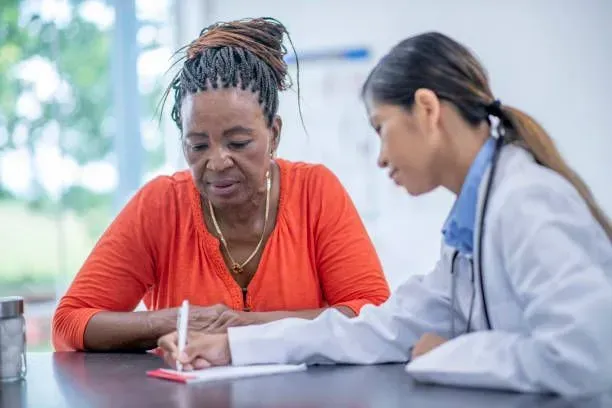10 Things to Have a Doctor Check After an Aging Person Falls

In the journey of aging, each step carries profound significance, and for seniors, a sudden fall can be a poignant turning point. At 7 Day Home Care, we recognize the challenges that follow such incidents and the vital role that comprehensive medical evaluations play in ensuring the continued well-being of our beloved seniors. In this article, we shed light on ten crucial aspects that we encourage loved ones to inquire about with a doctor, in an effort to have a thorough examination after a senior experiences a fall, emphasizing the importance of proactive and personalized care.
10 Things to Have a Doctor Check After a Senior Falls
- Injuries and Trauma: The immediate aftermath of a fall requires a thorough examination of potential injuries by a doctor. From head injuries, fractures, sprains to bruises, addressing physical trauma is the first step in crafting an effective care plan.
- Cognitive Function: A fall may sometimes be a manifestation of underlying cognitive issues. Doctors should assess cognitive abilities to rule out conditions such as dementia or confusion, ensuring a holistic understanding of the individual's health.
- Vision Changes: Changes in vision can significantly contribute to falls. An eye examination becomes crucial to identify any impairments or conditions that may need correction.
- Medication Review: The medications seniors take can impact balance and coordination. A comprehensive review ensures that medications are optimized, minimizing the risk of side effects or interactions that could contribute to falls.
- Blood Pressure: Orthostatic hypotension, a drop in blood pressure upon standing, can lead to falls. Regular monitoring helps identify and address this potential risk factor.
- Balance and Gait Assessment: Evaluating balance and gait helps uncover any impairments that may have contributed to the fall. Physical therapy or tailored exercises can then be recommended to improve stability.
- Foot Health: Examinations of the feet are essential. Pain, fallen arches, deformities, or inappropriate footwear can be addressed to enhance comfort and reduce the risk of future falls.
- Bone Density Evaluation: Seniors are more susceptible to fractures due to weakened bones. Assessing bone density helps in identifying osteoporosis and guiding interventions to maintain bone health.
- Home Environment Check: A doctor's evaluation, through a registered nursing home assessment should extend to the senior's living space. Identifying and rectifying potential hazards at home is crucial for preventing future falls.
- Overall Physical Health: A comprehensive physical examination is essential to understand the overall health of the senior. This includes assessing chronic conditions, identifying potential contributing factors to the fall, and crafting a holistic care plan.
Falling poses various risks for aging individuals, and failing to seek medical attention after a fall can exacerbate these risks. Here are the potential consequences:
Falling represents a substantial threat to the well-being of aging individuals, encompassing a spectrum of potential hazards. The immediate aftermath of a fall often results in physical injuries, such as fractures, sprains, and bruises, posing challenges to mobility and overall functionality. Additionally, the psychological toll can manifest as a fear of falling, leading to a self-imposed reduction in daily activities, social interactions, and independence. This decline in physical and social engagement may contribute to a cycle of decreased strength and increased vulnerability, amplifying the risk of subsequent falls.
However, one of the more severe and often undetected consequences of a fall is the risk of head and brain injuries. Failing to seek prompt medical attention following a fall may lead to undiagnosed trauma to the head, potentially resulting in concussions, contusions, or more severe injuries. Without appropriate medical intervention, these head injuries can have long-term consequences, including cognitive impairment, memory loss, and an elevated risk of developing neurological conditions. The absence of timely diagnosis and treatment not only jeopardizes the immediate health of the individual but also heightens the potential for persistent and debilitating effects on their cognitive and neurological well-being.
It is crucial for aging individuals who experience a fall to seek prompt medical attention. A healthcare professional can conduct a thorough evaluation, identify contributing factors, and develop a tailored plan to address both the immediate and long-term consequences of the fall. Regular medical check-ups can help manage overall health and reduce the risk of future falls, promoting a better quality of life for aging individuals.
At 7 Day Home Care, we believe in the power of comprehensive and compassionate care, especially when it comes to our senior community. By emphasizing these ten crucial aspects for doctors to check after a senior experiences a fall, we aim to foster resilience, promote well-being, and empower our seniors to embrace their golden years with confidence and dignity. Together, through proactive and personalized care, we can navigate the challenges of aging and ensure that each senior receives the support they need to lead a fulfilling and resilient life. Please call 516-408-0034 or visit 7 Day Home Care to learn more about our in-home health care services in Manhattan, Queens, Brooklyn, Nassau County, and Suffolk County, New York.
Brian Callahan
7 Day Home Care


Living With Parkinson’s Disease: How In-Home Care Helps Seniors Stay Safe, Independent & Comfortable








